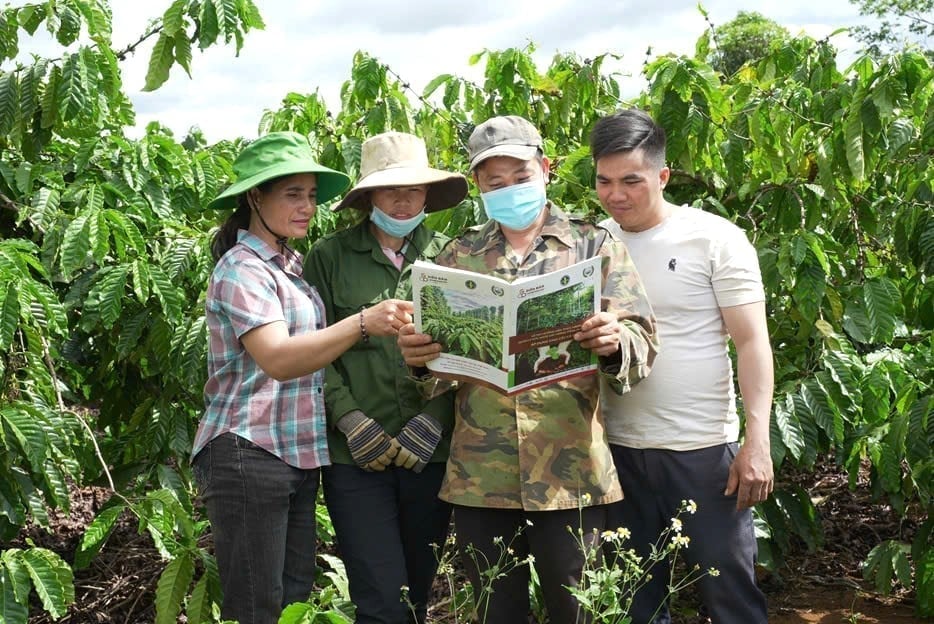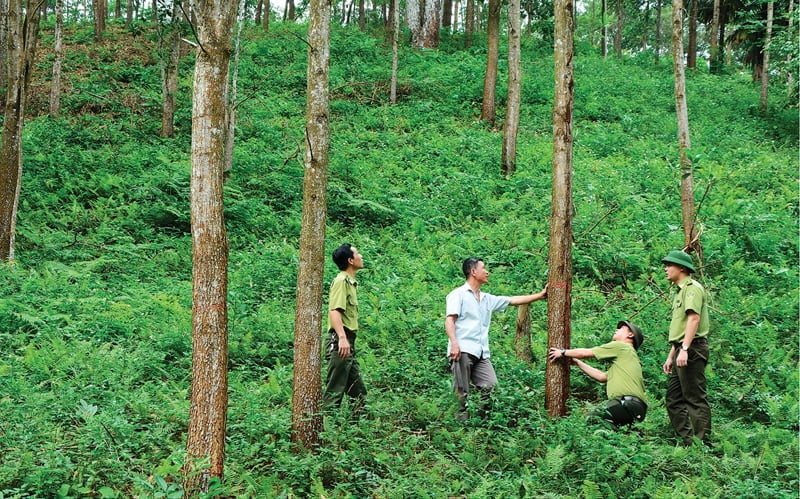November 10, 2025 | 19:23 GMT +7
November 10, 2025 | 19:23 GMT +7
Hotline: 0913.378.918
November 10, 2025 | 19:23 GMT +7
Hotline: 0913.378.918
Large areas of coffee and rubber, two key export commodities of Vietnam, are currently grown on contract land whose legal status is unclear. Mr. Nguyen Van Tien, Vice Chairman of the Vietnam Association of Agricultural and Rural Development Economics, raised this warning at a policy workshop on land contracting in state agricultural and forestry companies.
This situation may result in many staple agricultural products being removed from global supply chains because the rights to use the land where the crops grow are not clearly defined.

A coffee farmer in Dak Lak studies IPHM materials in the garden. Photo: Dinh Phuong.
This warning is not hypothetical but based on real data from state agricultural and forestry companies. According to Mr. Nguyen Van Tien, by 2024, Vietnam had 121 agricultural companies managing 447,058 hectares of agricultural land. Nearly 24 percent of that area is contracted to households. Similarly, data from the Department of Forestry and Forest Protection shows that over 160 forestry companies manage 1.14 million hectares of forest land, about 28 percent of which is contracted to households.
The problem is that some contracted areas are under contracts lasting decades, even up to 50 years, or tied to outdated decrees such as Decree 01/CP of 1995 or Decree 135/2005/NĐ-CP, which are now expired or no longer meet current legal and market requirements. Yet there is no policy framework to resolve expired contracts or contract areas that households still cultivate.
Contract land refers to land that state agricultural or forestry companies lease to workers or households for production. These contracts specify obligations for product delivery, contract duration, and responsibilities of both parties.
However, policy changes over time and uneven implementation have left tens of thousands of hectares of contracted land with no clear documentation or defined land rights, causing disputes or management confusion.
Mr. To Xuan Phuc, a Forest Trends expert, notes that the greatest risk now is that unclear land areas will not meet export market requirements, which demand legality and traceable origin.
New regulations such as the EU’s EUDR require strict standards for seven types of agricultural and forestry goods: production land must be legal, deforestation-free, and traceable to specific land plots. Mr. Phuc says that if coffee or rubber is grown on contracted land and producers cannot prove legal land use, the products are unlikely to comply with EUDR and may be barred from that market.
Companies have reported this issue. Mr. Pham Van Nghi, a member of the supervisory board at Vietnam Coffee Corporation, said his company adopted the contracting model under Decree 168/2016/NĐ-CP, but still faces areas where contracts cannot be renewed because workers resist switching from old contracting forms under Decrees 01 or 135 to the new model.
In some parts of Dak Lak province, contracted households have fenced off land and planted fruit trees instead of coffee, without delivering products or following contract terms.

The allocation of contracted land to local residents still faces many issues.
The rubber sector faces a similar challenge. According to the Vietnam Rubber Group, many member companies still have contracts under Decree 01/CP from 1995 and Decree 135/2005/NĐ-CP, with durations of 30 to 50 years. These contracts are no longer valid, but terminating or adjusting them is very difficult.
Land areas with unclear legal contracting risk prevent Vietnam from accessing the emerging carbon credit market, a new financing source expected to benefit the forestry sector.
In response to these issues, Conclusion No. 103-KL/TW dated December 2, 2024, by the Politburo ordered a full review of all land managed by agricultural and forestry companies in 2025. The review aims to identify land currently in use, under contract, white-leased, encroached, or misused. Particular consideration will be given to issuing land-use certificates to those occupying land without a contract, provided the land is not in protected forest zones.
According to the Planning and Finance Department at the Ministry of Agriculture and Environment, 126 agricultural companies manage over 478,000 hectares of land nationwide. Approximately 114,000 hectares are contracted under various forms, over 34,000 hectares are disputed, joint-venture, or unused, and more than 17,000 hectares remain under expired contracts issued under Decree 01/CP.
Thus, tens of thousands of hectares fall into a legal grey area. As Vietnam intensifies integration and shifts agriculture toward green transparency, the persistence of expired contracting mechanisms and unclear legal status poses major barriers, not only for export goods but also for the restructuring of the agricultural sector itself.
Contracts were once an effective tool for boosting production, but as Mr. Nguyen Van Tien observes, if not reformed to meet modern requirements, they become impediments.
He stresses that all land contracting agreements must be reviewed, revised, or terminated in accordance with the 2024 Land Law. In agriculture, land transparency is a key condition to overcome global challenges such as the green economy and the circular economy.
By the end of 2024, the country had more than 120 agricultural companies that were allocated or leased a total of 478,000 hectares of land by the State. Surveys show that contracted households have shifted from contracts under Decree 01 to those under Decrees 135 and 168, with the majority now operating under Decree 168.
Most of the contracted households are primarily engaged in agriculture. The average annual income per contracted household is VND 299 million, of which VND 192 million comes from the contracts with agricultural companies. Income from other agricultural activities is VND 85 million per year, while income from non-agricultural occupations is nearly VND 22 million per year.
* USD 1 = VND 26,335. Source: Vietcombank.
Translated by Huong Giang

(VAN) Rural tourism is emerging as a dual driving force, both promoting sustainable agricultural development and contributing to the creation of modern, civilized new rural areas.
![Clean data - Bright trust [Part 5]: Lessons from the grassroots](https://t.ex-cdn.com/nongnghiepmoitruong.vn/608w/files/news/2025/11/09/anh-chup-man-hinh-2025-11-09-204608-nongnghiep-205148.jpeg)
(VAN) Practical lessons drawn from the grassroots, wards and communes, have been further applied and promoted by Dong Nai province as it accelerates efforts to complete the 90-day campaign to update the land database.
![Clean data - Bright trust [Part 4]: Determination to let the people benefit](https://t.ex-cdn.com/nongnghiepmoitruong.vn/608w/files/news/2025/11/08/anh-chup-man-hinh-2025-11-08-071842-nongnghiep-071859.jpeg)
(VAN) Hai Phong City is determined to enrich and clean its land data, aiming for transparent management, streamlined procedures and direct benefits for the people.

(VAN) Viet Nam is proactively adapting to climate change, improving its institutional framework, fostering innovation, and strengthening international cooperation to achieve net-zero by 2050.

(VAN) Vietnam promotes integrated management of seas and oceans, institutional improvement, innovation, and international integration, aiming to become a prosperous and sustainable maritime nation.

(VAN) Khanh Hoa Province is rapidly transitioning to high-tech marine aquaculture to adapt to climate change and enhance the value and output of its seafood.

(VAN) As the world marks the 80th anniversary of the United Nations, progress in ending hunger — the world's most solvable problem - is falling behind.